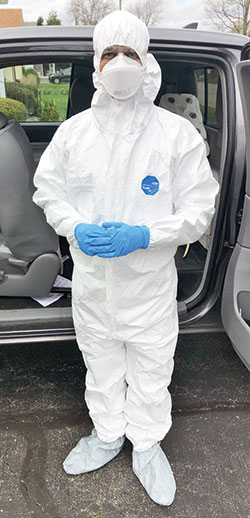Select priests ministering to the dying in pandemic use protective equipment

Father Sengole Thomas Gnanaraj, administrator of St. Elizabeth Ann Seton Parish in Richmond, wears a protective suit outside a home in Connersville before going in to anoint three family members—two who had tested positive for the coronavirus, including one who was believed to be close to death, and a third who was presumed to have been infected by the virus. (Submitted photo)
By Sean Gallagher
Early on after the coronavirus pandemic started to have significant effects on everyday life, archdiocesan vicar for clergy Father Eric Johnson and other archdiocesan leaders formulated protocols for the celebration of the sacraments for those close to death.
Because of the contagiousness of the virus and the dangers it poses to those infected by it, only priests who are young, free from complicating health conditions and live alone or could do so were asked to celebrate the sacraments for the dying.
Father Johnson spoke of the sacrifice this was for the priests who did not meet these conditions, including himself.
“That’s been very painful for them,” he said. “It’s the right decision, but our clergy want to be there when people need them. This is a tough time for all of us, because all of us want to be there.”
Archdiocesan Catholic Charities has supplied them with a wide array of protective equipment: gloves, face masks, glasses and even full-length protective suits that it has kept for use during relief work following natural disasters.
“We have the equipment to make priests as safe as they can be when they go into those situations,” Father Johnson said. “In addition to that, we’re choosing people to do that who are the least vulnerable.”
The designated priests are spread throughout the archdiocese’s 11 deaneries. Priests not on the list who receive a request for an anointing of a dying person pass it on to a priest who is.
“It’s a great blessing to be able to be there with these people as they’re dying and wanting the prayers of the Church and the sacrament of the sick,” said Father Sean Danda, pastor of St. Malachy Parish in Brownsburg, who is on the list. “I feel very blessed that I’m healthy enough to be able to go and do that for them.”
At the same time, these priests also provide updates on the sick and dying to members of their family who are not able to visit them in person.
“Many of them asked me questions about how
they looked,” said Father Aaron Jenkins, pastor of
St. Michael Parish in Greenfield, who is on the list. “Were they in pain? Were they suffering? All of these things that families are always concerned about and are able to see and experience because they’re typically there in the room. I’ve been kind of relaying that to them to some extent.”
Archdiocesan leaders and priests at the local level have been working with hospitals and nursing homes across the archdiocese to ensure that priests can have access to the dying to offer the sacraments and pastoral care.
At times, priests have been denied access, even when they have the proper protective equipment. But Father Johnson emphasized that this is an “evolving situation” in which administrators of facilities often re-evaluate their policies and find creative ways to work with priests so they can minister to the dying.
“I worked with Hancock Regional pretty early on to get me in,” said Father Jenkins of a hospital in Greenfield. “I really appreciate them doing that work with me.”
Making these arrangements is important, Father Johnson said, because “the ability to provide the sacraments and pastoral care to the dying is a very high priority for us.”
“As the Catholic Church in the community, we certainly recognize the very serious nature of the pandemic that we’re facing and the need to support those in the medical community who are putting themselves in a difficult position in order to care for others,” Father Johnson said. “At the same time, for Catholics, the sacraments are at the very center of our identity and experience of worship.
“That becomes particularly acute at the time when a person is stepping from this life to the next. It’s at that point when the Church very particularly strives to be present to individuals as they are taking that transition.”
Father Johnson has been impressed by the willingness of priests to minister in situations where they put their own health at risk.
“Our priests, overwhelmingly, have been willing to do whatever needs to be done to provide the sacraments for those who are moving from this life to the next,” he said. “Aside from celebrating the sacrament of reconciliation and the Eucharist, standing with somebody as they move from this life to the next ranks very high with regard to when priests feel that they are most authentically functioning as a priest.” †
Related article: Local priests care for the dying during coronavirus pandemic
